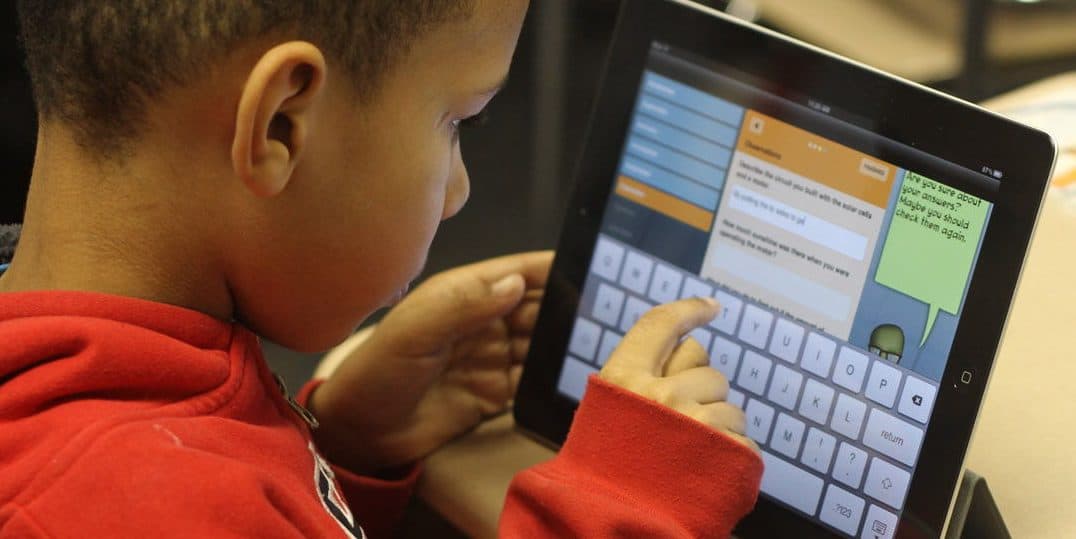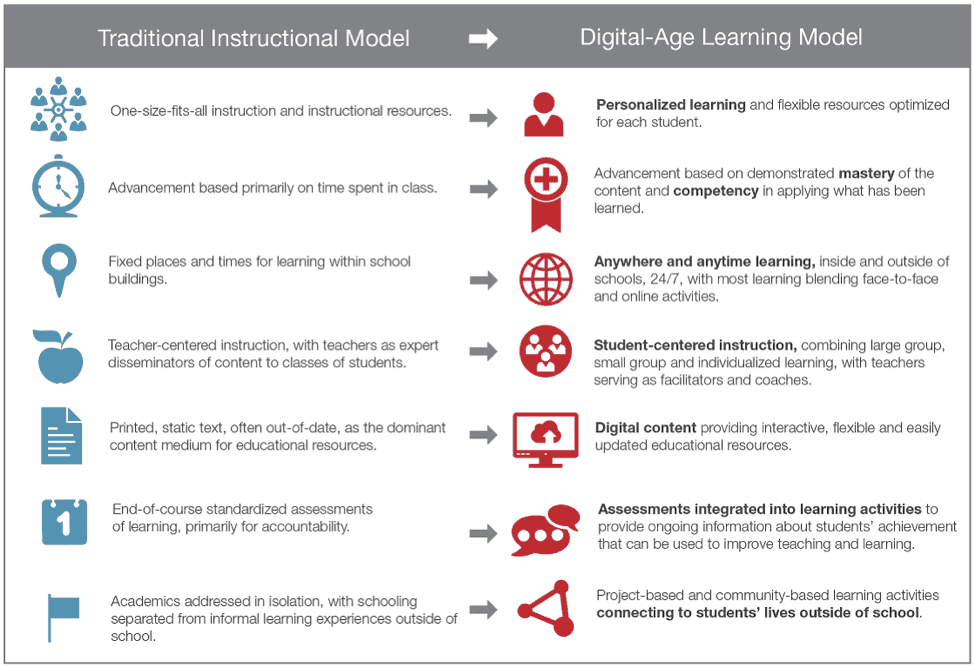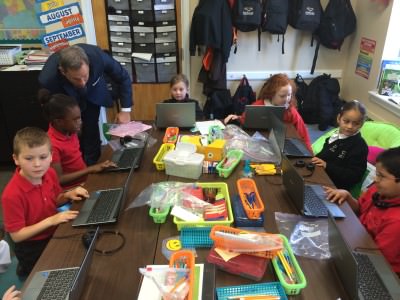

Welcome to our monthly feature on EducationNC called the NC STEM ScoreCard, written in partnership with the NC Science, Mathematics, and Technology Education Center (SMT) and the Burroughs Wellcome Fund. The previous edition of the STEM ScoreCard featuring the NC School for Science and Mathematics can be found here.
The goal of the NC STEM ScoreCard is to build broader awareness of how P-20 STEM* education is being nurtured across North Carolina and the impact on the well-being of our citizens and state. Three key questions framing this goal are:
- In what ways does the state directly invest in programming and innovations that promote STEM learning?
- In what ways are significant philanthropies and other organizations supporting STEM education and learning in North Carolina?
- What measurable impacts is North Carolina realizing from its strategic investments?
*Note: STEM here is an acronym for Strategies That Engage Minds
Strategic investment in specific programs that increase the numbers, quality, and impact of STEM teachers in North Carolina is a central focus of the NC STEM ScoreCard. One of those investments is in the William and Ida Friday Institute for Educational Innovation located on the NC State University Centennial Campus.
Friday Institute: A brief history
In 1988, the Triangle J Council of Government Model School Task Force Report promoted a world-class system of public education in the research triangle area through a vision of three model schools, one of which was the Centennial Campus Magnet Middle School (CCMMS), part of the Wake County Public School System but located on NC State University’s Centennial Campus.
The concept was that a school on NC State’s campus connected to a research institute offered a way to connect middle school students to professors and college students and deliver innovative teaching and learning strategies into the Wake County Public School System. This would also give that institute the opportunity for ongoing research, evaluation, teacher preparation and mutually beneficial professional development with a school located on the NC State campus.
CCMMS opened in 2000, and in 2002, Ann and Jim Goodnight contributed a substantial gift to name the research institute in honor of William (Bill) and Ida Friday. Bill Friday helped create and was the first president of the University of North Carolina system for 30 years from 1956-1986. In that role, his impact on North Carolina was profound. He helped shape national education programs, played a lead role in creating Research Triangle Park, and in retirement he continued to make important contributions to education. Both Bill and Ida were passionate advocates and leaders in education for more than 50 years.
After several years of fundraising and development, the Friday Institute opened its doors in 2005 with a state-of-the-art facility raised solely from private donations, a multi-million dollar faculty research program derived from federal grants and foundations, and an operations budget from the state of North Carolina. Currently, 82% of the Friday Institute’s budget is grant funded from local and national organizations.
A unique feature of the Friday Institute is that it is physically connected to the CCMMS. This partnership allows for the Friday Institute and the College of Education to have the opportunity for ongoing research, evaluation, teacher preparation, and mutually beneficial professional development with a public middle school located on the NC State campus.
Friday Institute: STEM-related work
North Carolina Digital-Age Learning Initiative
In 2014, the State Board of Education issued the Friday Institute a $2 million contract to launch the NC Digital Learning Initiative.
In 2015, the Friday Institute and the North Carolina Department of Public Instruction (NC DPI) published the NC Digital Learning Plan, with a goal to build upon their early work in digital learning, research and connectivity, and to develop a coherent long-term strategy that set directions and priorities, supported innovation, and provided resources to enable the state’s educators and students to benefit fully from digital-age teaching and learning.
In May 2018, the Friday Institute, along with NC DPI, celebrated a major feat — 1.5 million public school students in North Carolina’s more than 2,500 schools were officially connected to WiFi, making North Carolina the first state in the country to offer unlimited broadband to all students.
As part of the North Carolina Digital-Age Learning Initiative (NC DLI), the Friday Institute’s Professional Learning and Leading Collaborative continues to provide professional learning and capacity-building efforts, along with case studies to gauge the program’s successes, challenges, opportunities, and impact transitioning to personalized, digital-age learning.
The Friday Institute has worked with 111 of the state’s 115 school districts over the last three years alone, and a large number of districts are participating at every level.
The graphic below highlights the Friday Institute’s vision for developing the North Carolina Digital Learning Plan by summarizing some of the major transitions in teaching and learning transition needed at the classroom level.


Innovations in STEM Education Research
The Innovations in STEM Education Research team works to improve STEM education in formal and informal science settings and conducts research with students, families and educators. Their partners include schools, museums, science centers, and research institutes. Over the last year, they have worked with 68 educators in 7 districts encompassing 1,510 K-12 students. Continuing work includes:
- Families and Museums Exploring (FAME)
- zSpace STEM lab in Vance County Schools
- Master Science Hobbyists
Impact over the last year:
68 educators
1,510 K-12 students
7 districts
North Carolina Math/Science Education Network
Pre-College Program
This program provides middle and high school students with skills and experiences that equip them for careers in science, technology, engineering and mathematics (STEM) fields. Part of a STEM enrichment program with multiple locations, the NC State chapter partners with school districts and schools in northeastern and central North Carolina. The program recruits students from underserved populations in grades six through 12 who receive the following:
- Exposure to STEM careers
- Information about college admissions and scholarship
- Enrichment courses in engineering, math, science and technology
- Opportunities to participate in local-state competitions
Impact over the last year:
19 educators
686 K-12 students
3 districts
STEM Cyberlearning
The STEM Cyberlearning team designs and evaluates the innovative use of cyberlearning technologies in STEM instructional settings, with the goal of developing and identifying tools and strategies that lead to highly-resourced students and teachers. They work across disciplines and institutions to partner with research institutions and places of learning. A particular focus is helping North Carolina K-12 schools develop the next generation of STEM workers and learners.
Impact over the last year:
33 educators
1,616 K-12 students
9 districts
Computer Science for All
Partnering with North Carolina’s Department of Public Instruction and national organizations, the Friday Institute’s Computer Science for All team works to create greater exposure and opportunities for students in North Carolina to explore computer science. Most recently, they worked closely with the State Board of Education and the Department of Public Instruction to bring computer science education to all North Carolina schools. With this partnership, computer science was added to the NC Standard Course of Study beginning in spring 2019.
Impact over the last year:
345 middle school teachers
134 high school teachers
HI-RISE
The HI-RiSE team aims to help create positive, effective statistics and data education environments in a variety of ways. They are making a strong impact in the education of teachers and students from around the world and building foundations for data scientists and a data-informed citizenry.
Impact over the last year:
550 educators
1,200 K-12 students
2 districts
Questions for maximizing on this strategic investment
- How can the Friday Institute diversify its funding portfolio to be more strategic with its STEM research and practice in NC?
- How can the Friday Institute collaborate with its partners to make a greater impact in NC STEM education at the intersection of research, policy, and practice?
- How can the Friday Institute leverage its work with NC educators and students to further provide models of STEM innovation both nationally and globally?
Special thanks to Dr. Hiller Spires, Executive Director and Heather Bronson, Senior Communications Manager, Friday Institute for Educational Innovation, for their invaluable assistance in compiling this report.
Send comments on the NC STEM ScoreCard to coble@tpanalytics.com




